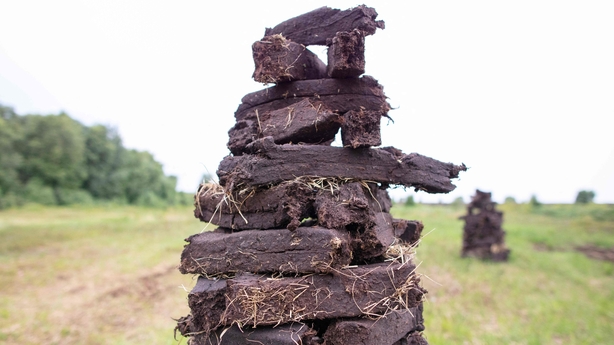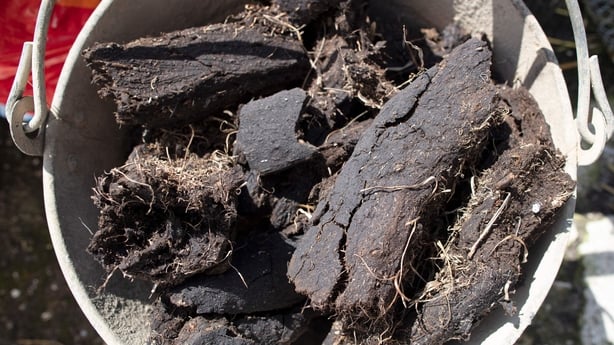The European Commission has referred Ireland to the EU Court of Justice for failing to halt the continued cutting of peat in areas designated to conserve raised bogs and blanket bogs.
It says these sites continue to be degraded through drainage and turf cutting activities, and insufficient action is being taken to restore the sites.
The case being taken against Ireland for failing to implement the habitats directive relates only to Peatlands Special Areas of Conservation.
This includes 55 blanket bog areas as well as a host of raised bogs.
Infringement, which started in 2010, is one of the longest running infringement cases in Europe.
In 2022, Ireland was warned of a potential court referral unless action was taken to half the cutting of peat.
The Commission's referral comes as the turf cutting season starts in April.
The turf cutting season starts in April on 20 percent of the bogs in Special Areas of Conservation where the cutting of turf is still taking place.
The National Parks and Wildlife Service is in active negotiations with the operators of these bogs to find solutions to ensure that they will cease operating.
The referral of the case to the European courts, and at the height of these negotiations on the eve of the turf cutting season, has inflamed the turf cutters and could potentially make agreement even harder to reach.

Some 2,454 people are already availing of the cessation of Ireland's turf cutting compensation scheme.
There has been a 40% reduction in turf cutting between 2020 and 2023, with even further reductions expected this year.
In addition, 20,000 farmers are engaged in a results-based programme for the restoration of blanket bog Special Areas of Conservation through the ACRES nature cooperation programme.
A spokesperson for Malcolm Noonan, Minister of State with responsibility for this area, said that Ireland will robustly defend its actions in relation to the bogs and has put enormous efforts, money, and commitments in place, and has been leading from the front in terms of nature restoration in the European Union.
EU accused of bullying Ireland
The Turf Cutters and Contractors Association has accused the European Commission of bullying Ireland and is threatening to withdraw from Negotiations with the National Parks and Wildlife Service (NPWS) that are aimed at finding a solution to ensure the cessation of large scale turf cutting.
It follows the decision of the European Commission this morning to refer Ireland to the European Court of Justice.
The infringement dates back as far as 2010 and the Commission issued two reasoned opinions about the matter in 2011 and 2022.
The bog cutting season is about to start in April and the owners of the bogs on which cutting is still taking place are at a sensitive stage of negotiations with the NPWS to find solutions to ensure that harvesting from the bogs could be ceased.

However, in a statement this evening Independent TD for Roscommon-Galway Michael Fitzmaurice, who is the Chairman of the Turf Cutters and Contractors Association (TCCA) said the European Commission's decision has obliterated years of progress made between the NPWS and domestic turf-cutters and contractors.
Deputy Fitzmaurice said that just under a year ago, he personally visited the European Commission to articulate, on behalf of both the Turf Cutters and Contractors and the people of Ireland, the unique challenges involved in managing so-called bog land Special Areas of Conservation within the Irish context.
During the meeting, he provided a comprehensive overview to a panel comprising legal and scientific advisors, as well as members of the Commission, demonstrating the significant progress made through collaboration between national authorities, particularly the National Parks and Wildlife Service and Turf Cutters and Contractors.
However, Deputy Fitzmaurice now states that this progress has been "obliterated" by the Commission’s decision, which he believes unwinds years of advancements and understanding.
He said there are far-reaching implications of this issue, which he says will "be felt across the country", undermining the delicate balance achieved between national authorities and those directly impacted by the Habitats Directive.
Deputy Fitzmaurice, also announced plans to convene a meeting of the Turf Cutters and Contractors Association to deliberate on critical next steps.
The meeting will consider the withdrawal of cooperation in relation to the re-wetting of lands and whether to resume dialogue with the NPWS.
Deputy Fitzmaurice emphasised the significance of recognising that the lands in question are, fundamentally, people’s private property. He argued that the European Union’s directives severely infringe upon the rights of these property owners.
Despite considerable progress made in recent years through the collective efforts of all stakeholders to address these issues, he now fears that "all such progress is at risk".
Casting the European Commission’s decision as an instance of the "EU tail wagging the Irish dog", Mr Fitzmaurice contended that national authorities and stakeholders in Ireland have demonstrated their capability to manage this complex issue effectively.
Inflicts unnecessary 'pain, suffering, and distress'
He lamented that this unilateral move by the EU not only disregards the nuanced understanding and agreements reached domestically but also inflicts unnecessary "pain, suffering, and distress" upon many Irish citizens.
"Today’s decision creates the serious risk that we will see a complete breakdown in cooperation between stakeholders domestically, and may very well see a return to tensions on Irish bogs which in recent years had been defused," Mr Fitzmaurice said.
In reflecting on the progress of recent years in the context of today's decision by the European Commission, Mr Fitzmaurice noted the evolving nature of Irish society and its practices, in particular, that the tradition of turf cutting is naturally diminishing, with newer generations moving away from practices necessitating peat as fuel.
"The day of turf cutting is, sadly, coming to an end," He said, pointing out that EU directives and changing domestic practices - such as the construction of houses without chimneys - were already leading towards a natural resolution of the issue within a generation.
"The EU has once again shown that it is out of touch with reality and is more interested in using a hammer to crack this nut than diplomacy. Which is my book is the mark of a bully.
"I will do all I can to ensure the arguments advanced at the ECJ are reflective of the reality on the ground here in Ireland."







